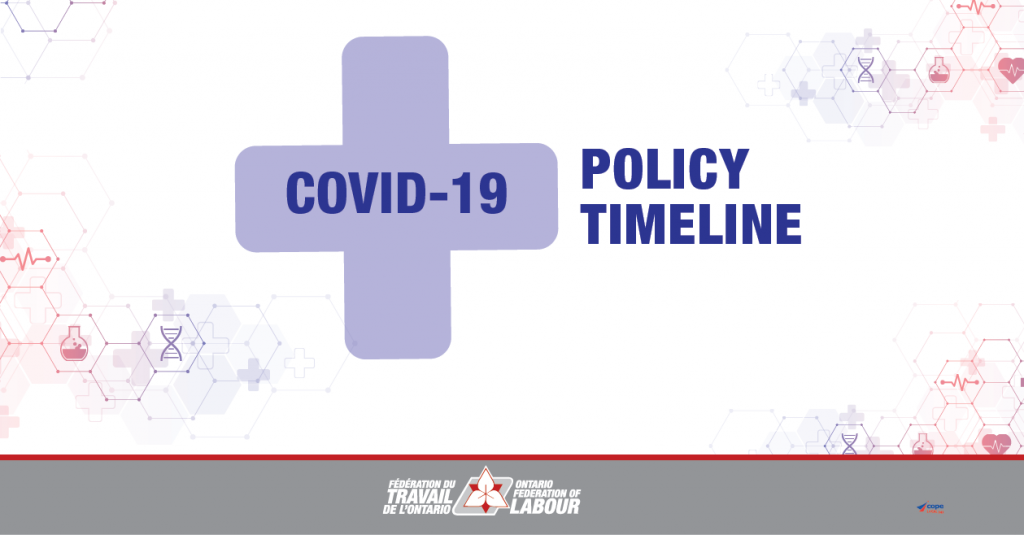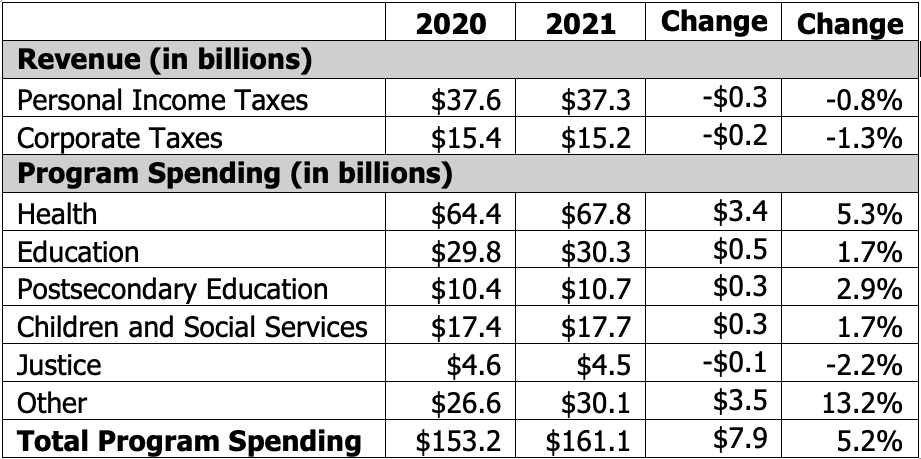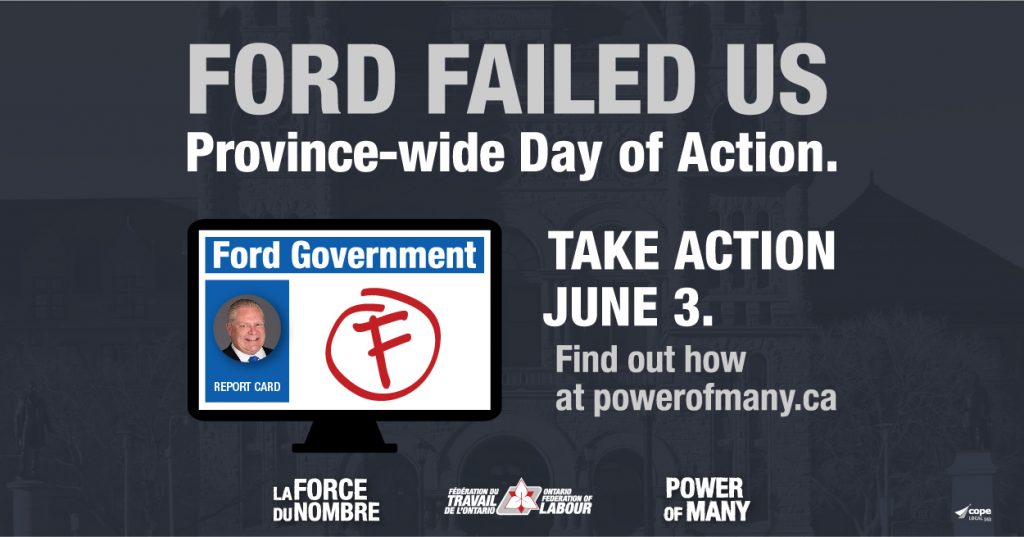
This list was last updated on May 1, 2020. Please note that this is a working document and will be updated frequently.
For more information on OFL’s advocacy for workers during the COVID-19 crisis click here.
Below is a policy timeline on COVID-19 for reference and sharing. The OFL will continue to monitor policy changes as further information becomes available. Our advocacy work continues, and we will stay vigilant in pressing the government on our demands.
You can also download the OFL’s info sheets on short-term and long-term actions to avoid the harm that the virus can bring to your health and to the people in your communities, and access more information from the OFL and its affiliates here.
COVID-19 policy updates:
May 1, 2020
April 30, 2020
- Announced 65 new rules and regulations that Ontario businesses must follow (e.g., installing Plexiglas barriers, distributing hand sanitizer to workers, maintaining safe physical distancing) — and dispatched only 58 new inspectors to help enforce them. (Note: The health and safety guidelines for businesses in different industries mention that as a last resort, PPEs should be considered.)
April 29, 2020
April 27, 2020
- Revealed that the government has failed to uphold a single work refusal that has been filed from the more than 200 workers that fear contracting the virus.
- Released a three-phased framework to re-open the economy once COVID-19 subsides. (Note: This plan seems singularly focused on businesses and fails to consult workers and the unions that represent them [see OFL press release].)
April 26, 2020
- Announced that all publicly funded schools will remain closed until at least May 31st and an expanded summer learning program will be introduced – focusing on credit recovery, supports for vulnerable students, and course upgrading.
- Limiting the dispensing of prescription drugs to 30 days with some exceptions and announced that the government will not be covering prescription co-payments.
April 25, 2020
- Announced a $4 per hour “pandemic pay premium”, which will be paid on top of existing hourly wages for some frontline workers. (Note: This includes those workers in long-term care homes, retirement homes, emergency shelters, supportive housing, and those providing home and community care. The top-up will continue for 16 weeks from April 24th onwards. Further, those eligible workers working more than 100 hours a month are expected to receive lump sum payments of $250 per month for each of the next four months.)
- Permitting health service providers, including hospitals, to redeploy workers to provide services and supports in long-term care homes. (Note: Similar to other redeployment plans for workers, it’s unclear whether these individuals will receive the proper sector-specific health and safety training and PPE.)
April 24, 2020
- Forced the Ontario labour board to order weekly safety inspections at three nursing homes after COVID-19 deaths.
- Committing $241 million to help cover commercial rent in Ontario under a new emergency program (i.e., Ontario-Canada Emergency Commercial Rent Assistance Program) – with the federal government providing the rest of the $900 million program.
- Underreporting the number of fatalities related to COVID-19 due to a discrepancy in data of long-term care homes.
- Allowing hospitals to resume discharging patients to retirement homes – provided the home does not have a COVID-19 outbreak and the patient has tested negative for the virus.
April 23, 2020
- Forced unions to seek legal recourse to demand that long-term care homes provide frontline workers with PPE.
- Announced that 250 additional personnel from the Canadian military will be deployed to 5 Ontario long-term care facilities based on need. (Note: Similar to other redeployment plans for workers, it’s unclear whether these individuals will receive the proper sector-specific health and safety training and PPE.)
- Extended all corresponding emergency orders until May 6th.
April 22, 2020
- Announced that they will now begin “proactive” testing of all asymptotic residents and workers in long-term care homes. (Note: This measure has been introduced after 400 lives have been lost as a result of COVID-19 in the LTC facilities.)
- Corrected a legal provision that made it impossible to contest a provincial offence.
April 21, 2020
April 20, 2020
- Failed to see the importance of collecting equity-based data during the pandemic. (Note: The reality is that COVID-19 does not affect everyone equally. Equity-seeking groups continue to be disproportionately affected in multiple realms, including increased risk of exposure and decreased access to health care.)
- Clawing back the federal Canada Emergency Response Benefit for social assistance recipients.
April 17, 2020
- Rejected the call to take over operations at two of the hardest hit long-term care homes in the province, where at least 54 residents have died and 149 people have contracted COVID-19.
- Issued an emergency order that now allows Ontario ambulance services to hire college students in ambulance/paramedic programs — who have not yet graduated — to provide services appropriate to their skill level.
- Note: Similar to other redeployment plans for workers, it’s unclear whether these students have received the proper training to do the job, as well as sector-specific health and safety training and PPE.
- Announced that school boards will be distributing free iPads to kids who cannot access the Province’s online learning tools.
- Note: The reality is that no new monies have been allocated to school boards and children are not receiving iPads.
- Expanded child care to a wider group of essential service workers, including those who work in group homes, homeless shelters, child welfare and women’s shelters.
April 16, 2020
- Enabling auto insurance companies to give temporary premium rebates to drivers. (Note: The onus to act is on auto insurance companies – and there is very little incentive for them to do so.)
April 15, 2020
April 14, 2020
- Extended Ontario’s state of emergency by 28 days to May 12th.
- Underreporting the number of deaths in long-term care and retirement homes.
- Restricting long-term care workers to one facility, beginning next week, for two weeks. (Note: This does not apply to temp agency workers or “critical” contract workers.)
April 13, 2020
April 10, 2020
- Banned fees for child care centres closed during COVID-19 shutdown. (Note: This announcement fails to include a plan to sustain child care centres. The government must provide emergency stabilization funding for the child care sector immediately.)
April 9, 2020
- In Ontario, 403,000 jobs were lost in March and the unemployment rate increased to 7.6% from 5.5%.
- Created a new Ontario Jobs and Recovery Committee, assessing the impact of COVID-19 on the economy and on businesses.
April 8, 2020
- Announced enhanced safety measures and workplace inspections for essential businesses.
- Suspended environmental oversight rules, allowing the government to push forward projects or laws that can significantly impact the environment, without consulting or notifying the public.
April 7, 2020
- Launched an online portal to match skilled frontline health care workers with employers. (Note: This includes retired or non-active health care professionals, internationally educated health care workers, volunteers with experience, and students.)
April 6, 2020
April 3, 2020
- Pared down the list of “essential” workplaces from 74 to 44, now including non-essential construction.
- Overrode provisions in collective agreements for public health unit workers (e.g., assigning non-bargaining unit workers to perform bargaining unit work).
April 3, 2020
- Overrode provisions in collective agreements for public health unit workers (e.g., assigning non-bargaining unit workers to perform bargaining unit work). (Note: This was not done in consultation with affected unions.)
March 31, 2020
- Announced that Ontario schools and child care centres will remain closed until at least May 4, 2020.
March 30, 2020
- Announced that they will be extending the emergency declaration for another two weeks.
- Recommending that individuals aged 70 and over as well as those people with compromised immune systems or underlying health conditions self-isolate.
- Ordered the shutdown of all outdoor recreation amenities.
March 30, 2020
- Announced that they will be extending the emergency declaration for another two weeks.
- Recommending that individuals aged 70 and over as well as those people with compromised immune systems or underlying health conditions self-isolate.
March 29, 2020
- Announced health and safety measures for construction sites. (Note: Social and physical distancing is still not addressed.)
March 28, 2020
- Prohibited organized public events and social gatherings of more than five people.
- Announced new penalties to combat price gouging on “necessary goods”.
- Proclaimed the Supply Chain Management Act to centrally manage public sector supply chains, particularly around PPEs.
March 27, 2020
- No policy changes
March 26, 2020
- Extended the deadline to apply for the Ontario Autism’s interim one-time funding.
- Allowed at-home delivery of alcohol through restaurants – not the LCBO.
March 25, 2020
Released the Fiscal and Economic Update
.
- The Fiscal Update is based on optimistic assumptions that COVID-19 will have minimal effect on government revenues from personal income and business taxes; Ontario’s low unemployment rate will not significantly rise this year; and Ontario will be back to growth in the second half of the year. ( NOTE: Private sector forecasts show that Ontario’s economy may contract by 5.6% in 2020.)
- Forecasts a 0.8 per cent drop in personal income tax revenues, meaning just $300 million less in provincial coffers, despite the widespread layoffs announced in the past few weeks.
- Forecasts a 1.3 per cent drop in corporate tax revenue, just a $200 million hit to the treasury.
- While health care spending will increase by 5.3% this year, it is important to understand that this is the number required to fund health care to meet non-crisis levels – accounting for inflation, population growth, the aging population, and decades of neoliberalism. To respond to the current COVID-19 crisis, significantly greater funding is required.
- Direct income supports include providing parents with children under 12 with a one-time payment of $200 ($250 for those with special needs) & low-income seniors will get up to $83 with a doubling of a guaranteed income benefit for six months. (Note: Failed to top up the federal government’s Canada Emergency Response Benefit or provide immediate income supports for those that do not qualify for it (e.g., those on ODSP or OW).
- Provided up to $10 billion in tax deferrals: delaying the collection of most provincial business taxes for five months, deferring education property tax payments for three months, and deferring Workplace Safety and Insurance Board payments for up to six months – as well as temporarily reducing the employer health tax for 90 per cent of Ontario businesses.
- Suspended OSAP repayments for six months.
March 24, 2020
March 23, 2020
- Announced $148 million in social services funding for municipalities and organizations such as shelters, food banks, emergency services, charities and non-profits.
- Announced the creation of a $52 million Emergency Assistance program through Ontario Works (OW) for those who do not qualify for emergency financial supports under federal programs.
- Announced the mandatory closure of all non-essential workplaces in Ontario as of March 25th.
- Overrode provisions in collective agreements for long-term care workers (e.g., assigning non-bargaining unit workers to perform bargaining unit work). Note: This was not done in consultation with affected unions.
March 22, 2020
- Announced plans to allow child care centres to open for free for health care and other frontline workers, including doctors, nurses, paramedics, firefighters, police, and correctional officers (Note: This was not done in consultation with affected unions).
March 21, 2020
- Overrode provisions in collective agreements for hospital workers (e.g., assigning non-bargaining unit workers to perform bargaining unit work). (Note: This was not done in consultation with affected unions.)
March 20, 2020
- Announced the availability of independent learning courses as well as online resources and greater educational TV programming from public broadcasters TVO and TFO — during the school shutdown. (Note: This was done without consultation from education unions and does not address the needs of students without a home computer or access to the internet.)
- Announced that the three-month waiting period for OHIP coverage has been waived and that the Province will cover the cost of COVID-19 services for those that are uninsured (i.e., who do not meet the criteria for OHIP coverage).
March 19, 2020
- Passed the Municipal Emergency Act.
- Bill 187 lays out the ability for members of local councils, boards and committees, during local and province-wide emergencies, to participate electronically in both open and closed meetings, and to be counted for the purposes of quorum.
- The Lieutenant Governor in Council can also, under the new legislation, impose limits and conditions on the powers wielded by municipalities.
- Passed the Employment Standards Amendment Act (Infectious Disease Emergencies).
- Bill 186 entitles employees to job-protected leaves of absence from their employment without pay and if they are unable to work due to reasons related to designated infectious disease emergencies. Those reasons include being under medical investigation, supervision or treatment, in quarantine or isolation, caring or supporting another person, or being affected by travel restrictions.
- The Bill also removes employers’ ability to provide a sick note, though employees may still be required to provide other “evidence reasonable in the circumstances” if they utilize such leave.
- Note: Bill 186 fails to deliver on several measures, including covering all workers and providing paid leave for workers to make it financially feasible [see OFL’s press release for more details]. Also, essential workers, who may not be traditionally considered “essential” may be exempt from the legislation, and those regulations are yet to be determined.
- Announced additional measures including extended validity for health cards and drivers’ licenses, and a court order to suspend the enforcement of evictions.
- Altered regulations to allow businesses (and workers) to deliver goods at all hours of the day, without restriction from local noise bylaws, to keep stores restocked.
- Promised to not follow Quebec’s example in trampling collective bargaining rights for education workers during the crisis.
- Talking with auto manufacturers to see if they can retool their equipment to produce ventilators, and liaising with companies like Canada Goose who might be able to use their sewing equipment to produce medical gowns.
- Considering waving the three-month waiting period that normally exists for individuals returning to Canada to access OHIP. (Note: The government has not yet committed to extending OHIP coverage for newcomers.)
March 18, 2020
- Suspended a major portion of their healthcare overhaul due to COVID-19, weeks before the changes were set to take place. (Note: Bill 74 privatizes health care services; dismantles government agencies such as LHINs, Cancer Care Ontario, and the Trillium Gift of Life Network; and folds patient care into a “super agency” [see OFL’s submission on Bill 74].)
- Closed provincial parks.
- Recommended that licensed retirement homes only allow essential visitors – people visiting residents who are very ill or require end-of-life care – until further notice.
- Announced a 6-month moratorium on interest for student loans will be implemented. (Note: This fails to address financial viability around the principal amount.)
March 17, 2020
- Declared a state of emergency in Ontario. (Note: Limited funds will be distributed to hospitals; testing and screening; personal protective equipment and other supports for frontline workers; long-term care homes; residential facilities in developmental services, gender-based services, and protective care for children and youth; and Indigenous communities.)
March 16, 2020
- Announced substituting the full 2020 budget with a fiscal outlook for the current year, including measures to address the pandemic, to be delivered on March 25th at 4pm [see OFL’s provincial demands].
- Announced the shut down of Ontario courts, including the Superior Court of Justice and the Human Rights Tribunal of Ontario.
March 15, 2020
March 13, 2020
March 12, 2020
March 11, 2020
- Declared a global pandemic by the World Health Organization.
- Announced a $100-million contingency fund with monies allocated towards equipment (e.g., testing kits and personal protective gear) and hiring more health-care staff. (Note: This amount of money can be considered a rounding error when looking at the entirety of the Province’s finances.)
TT/ph/cope343

